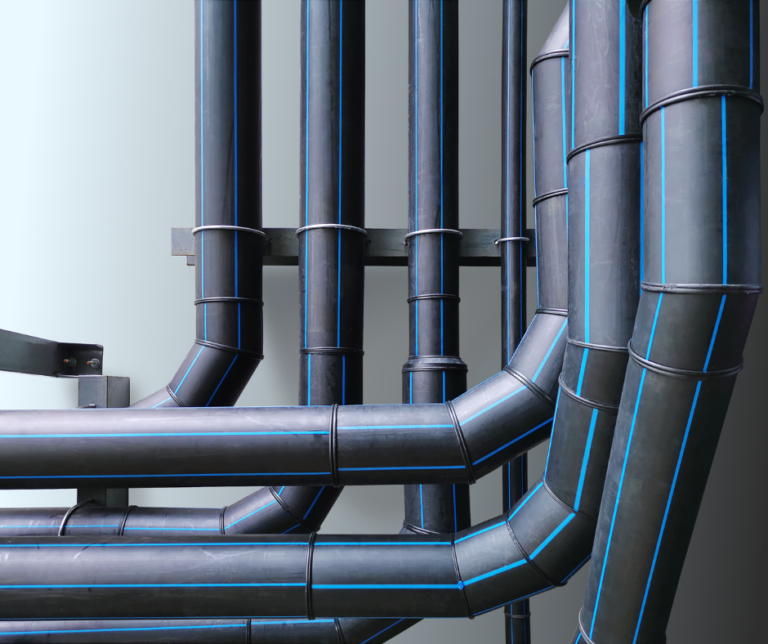Understanding the Key Perks of HDPE Pipe for Water and Wastewater Monitoring
The use of HDPE pipe in water and wastewater management offers countless benefits that warrant consideration. Its extraordinary sturdiness and lengthy life-span make it a favored selection for many projects. In addition, the material's resistance to deterioration and chemical damage boosts its integrity in numerous environments. Nevertheless, the benefits extend beyond just durability and resistance. Exploring its cost-effectiveness and ecological effect reveals also a lot more compelling factors for its extensive adoption in modern-day facilities
Outstanding Sturdiness and Longevity

HDPE pipe stands out for its outstanding toughness and longevity, making it a favored option in water monitoring systems. Built from high-density polyethylene, these pipelines can endure substantial pressure and stress and anxiety, making certain trustworthy performance with time. Their robust nature enables them to withstand severe environmental problems, consisting of temperature level fluctuations and soil motions, which can cause various other products to fall short.
The lifespan of HDPE pipes usually exceeds 50 years, providing a cost-effective service for towns and markets alike. Furthermore, the product's light-weight residential or commercial properties simplify installment, reducing labor costs and durations. This resilience reduces the demand for constant repairs or replacements, further enhancing its financial allure.
In water management applications, the reliability of HDPE pipelines suggests less interruptions and improved service connection, making them integral to lasting framework development. The mix of durability and long life solidifies HDPE's duty as a foundation in effective water management remedies.

Resistance to Rust and Chemical Damage
While several products give in to deterioration and chemical damage over time, HDPE pipelines exhibit amazing resistance, making them perfect for numerous water management applications. This durability stems from the molecular structure of high-density polyethylene, which is naturally non-reactive and does not corrode like steels or deteriorate from direct exposure to harsh chemicals. Therefore, HDPE is extremely efficient in atmospheres with aggressive compounds, such as wastewater systems that might include acids, bases, and natural solvents.
Additionally, HDPE pipelines can withstand ecological variables such as dirt acidity and saline problems, even more enhancing their suitability for diverse applications (American Plastics HDPE Pipe Manufacturing). Their capacity to keep structural honesty with time reduces the danger of leaks and failings, which is vital in making certain the safety and dependability of water distribution and wastewater administration systems. The resistance to deterioration and chemical damages markedly contributes to the total effectiveness and longevity of HDPE piping services.
Cost-Effectiveness and Economic Benefits
When thinking about the economic ramifications of water monitoring systems, the cost-effectiveness of HDPE pipes ends up being obvious. These pipelines supply reduced installment and upkeep prices contrasted to standard materials like metal or concrete. Their lightweight nature streamlines transportation and setup, resulting in decreased labor expenses. In addition, HDPE pipes exhibit a long life-span, often surpassing half a century, which converts to fewer substitutes and long-lasting cost savings.
The resistance of HDPE to deterioration and chemical damage reduces the requirement for pricey repairs and substitutes. The pipelines likewise click for more info sustain effective water circulation, minimizing energy prices connected with pumping systems. By minimizing leaks and water loss, HDPE pipelines contribute to substantial economic advantages for communities and useful link industries alike. On the whole, banjo pipe fittings the initial financial investment in HDPE piping can generate considerable financial returns over the life expectancy of the water management system, making it a prudent selection for sustainable framework growth.
Ecological Sustainability and Reduced Effect

Versatility and Flexibility in Installation
Because of their one-of-a-kind properties, HDPE pipelines supply amazing adaptability and versatility in installment, making them appropriate for a wide variety of applications. Their light-weight nature enables less complicated handling and transport, minimizing labor costs and installment time. HDPE pipes can be curved and formed to fit various terrains and project needs, which is especially useful in challenging settings.
Furthermore, their resistance to corrosion and chemical damages permits installment in diverse setups without the requirement for specialized protective layers. The capability to fuse joints creates a continual, leak-free system, improving the overall honesty and reliability of the installment. HDPE's versatility also fits ground motion, lowering the threat of damage in locations vulnerable to moving dirt. In general, these features make HDPE pipes not only functional but additionally a recommended selection for water and wastewater management systems.
Frequently Asked Questions
Exactly How Does HDPE Pipe Contrast to PVC in Water Monitoring Applications?
HDPE pipe offers premium versatility, resistance to corrosion, and resilience contrasted to PVC. Its lighter weight helps with simpler setup, while its lengthy life expectancy reduces replacement prices, making HDPE a favored option in water administration applications.
What Is the Life-span of HDPE Pipes Under Common Conditions?
Under regular conditions, HDPE pipes can have a lifespan ranging from 50 to 100 years. Their toughness and resistance to deterioration contribute to their long-term performance in numerous applications, making them a dependable choice for infrastructure.
Are HDPE Pipes Recyclable After Their Life Span?
Yes, HDPE pipes are recyclable after their solution life. hdpe pipe in stock Midland TX. They can be refined and repurposed into new items, greatly reducing ecological influence and advertising sustainability within the market, making them an environment-friendly option for piping options
What Is the Setup Process for HDPE Pipeline?
The installation process for HDPE pipelines involves website preparation, trenching, pipe fusion or mechanical signing up with, backfilling, and stress testing. Appropriate techniques assure a durable and reliable system for transferring water and wastewater properly.
Can HDPE Water Lines Be Used for Both Safe And Clean and Non-Potable Water Systems?
Yes, HDPE pipes can be used for both safe and clean and non-potable water supply. Their flexibility, sturdiness, and resistance to deterioration make them appropriate for different applications, ensuring safe and efficient transport of water in various contexts.